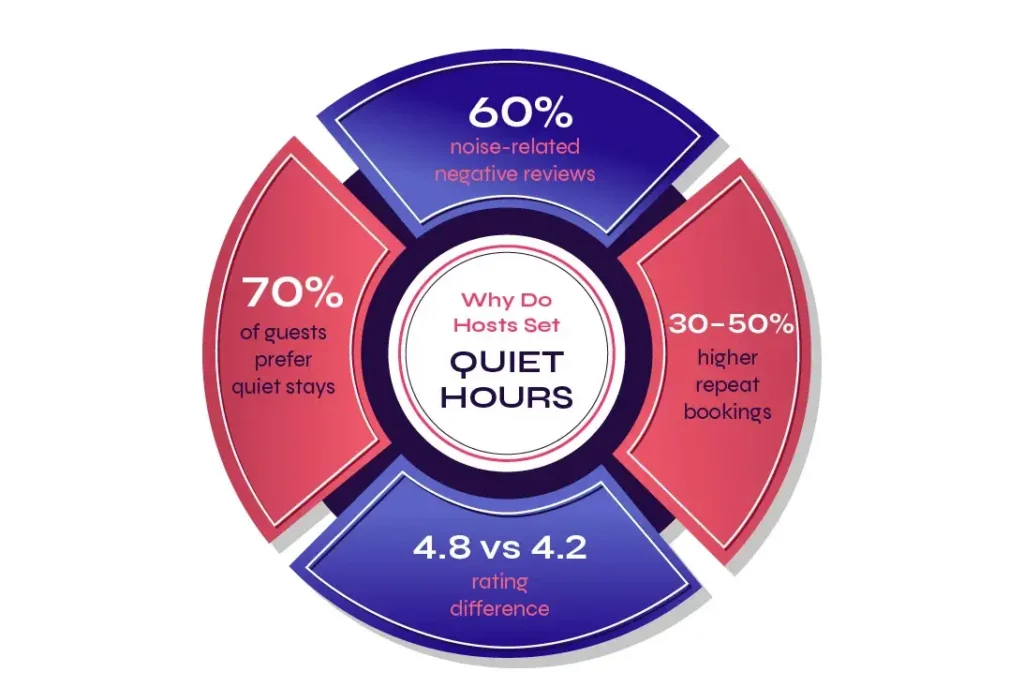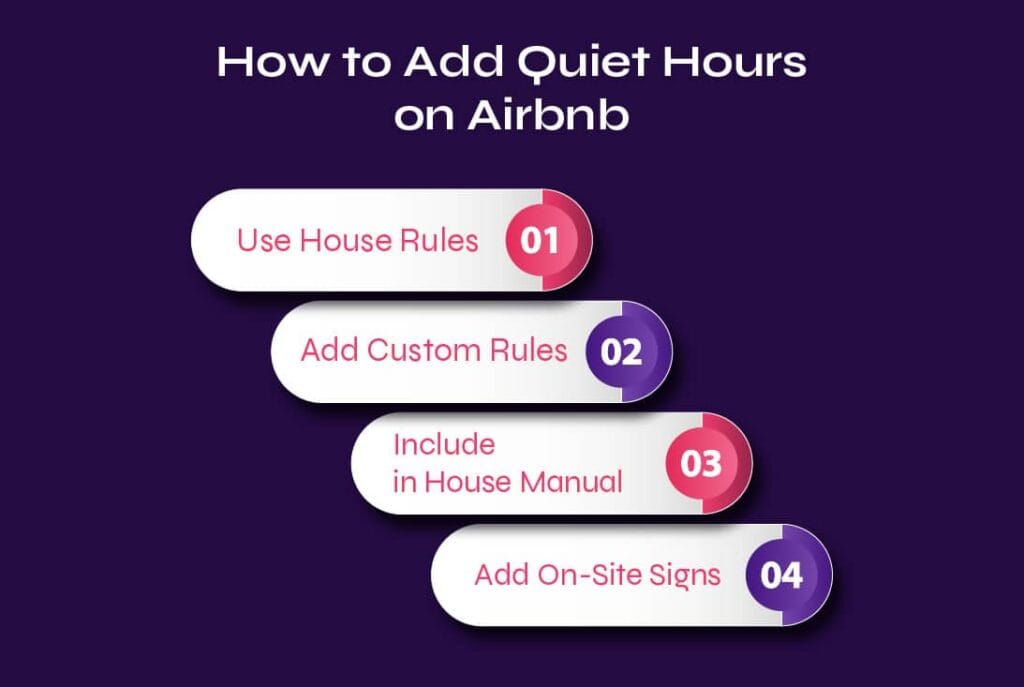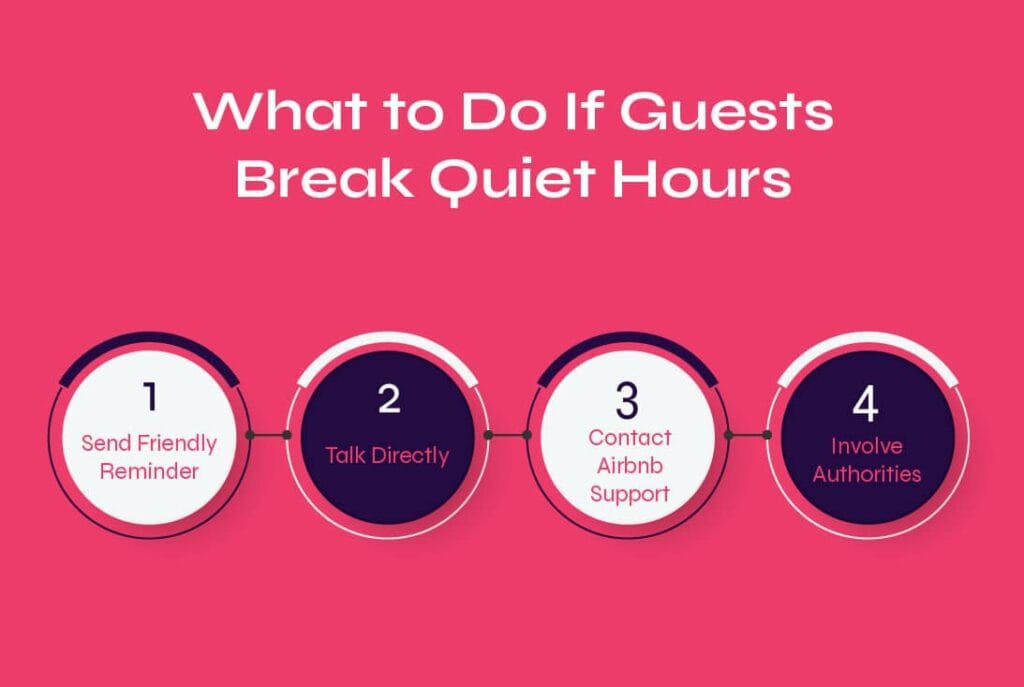Airbnb’s quiet hours are the specific times when guests should keep noise levels low, usually at night between 10 PM and 7 or 8 AM. Quiet hour rules are important to maintain peace for guests, hosts, and neighbors.
However, the timeframe can vary from one location to another. Some local ordinances also have rules to keep noise levels down; otherwise, hosts may face penalties.
As an Airbnb host, you never want to face any penalties, so we’re here to talk about everything related to Airbnb quiet hours.
We’ve explained what quiet hours mean for those new to this term. We’ve also discussed their importance and region-specific quiet hour rules so you can set them properly for your Airbnb. Furthermore, we’ve shown how you can easily add these rules to your listing.
For guests, we’ve discussed the proper etiquette to follow during quiet hours. As a bonus, we’ve also shared how STR Assistance can help you set up quiet hours correctly to ensure a peaceful stay for your guests.
What Does Quiet Hours Mean On Airbnb
Airbnb hosts set Airbnb quiet hours for guests so that during these hours, guests keep the noise levels low. This rule maintains a peaceful environment. Quiet hours rules are more important in multi-unit accommodations so guests do not get disturbed.
The quiet rules help control noises from activities like TV, parties, music, loud conversations, or drunk and loud behavior late at night. Many hosts also use noise monitoring devices like NoiseAware and Minut to detect noise levels.
Airbnb does not have an official quiet hours policy. Hosts themselves set the specific hours, often from 10 PM to 8 AM. They set the ground rules based on their property, location, and type of guests.
- Many cities and neighborhoods have local noise laws or ordinances that Airbnb hosts must follow.
- Type of property: apartments or condos, detached homes, or villas.
- Neighborhood environment: it can be residential areas, tourist areas, or downtown zones.
- Home layout and soundproofing.
Hosts must clearly mention quiet hours in their house rules or Airbnb guidebook to stay transparent with guests. Some may mention the specific hours in the house rules or in a digital book. It is also important to mention the consequences for violations. Guests should also stay respectful of the quiet hours rules.
Why Do Hosts Set Quiet Hours?

Up to 60% of negative reviews on short-term rental platforms come from noise complaints. This makes it more important for hosts to set quiet hours. Also, hosts need to ensure all the guests sleep properly, and no neighbours get irritated.
Guest Comfort and Sleep: Quiet hours help guests enjoy restful sleep, and most travellers prioritize this comfort. Studies show that around 70% of guests prefer a quiet environment when choosing accommodations. Using an Airbnb Host Checklist ensures you don’t miss any key steps.
Consideration and Respect: Setting quiet hours promotes consideration among guests and hosts and a respectful environment.
Respecting quiet hours also encourages repeat bookings. Hosts report a 30-50% increase in returning guests when noise policies are clearly communicated and enforced.
Positive Reviews and Experience: Hosts with well-communicated quiet hours see an average review rating of 4.8 out of 5, compared to 4.2 out of 5 for hosts without clear noise rules. Positive reviews boost visibility and bookings. According to Airbnb data, 92% of top-rated hosts have quiet hours and other considerate policies.
Neighbor and Community Relations: Many places have rules to keep noise levels down so people don’t get disturbed. In fact, more than 50% of the cities around the world have quiet hours. If someone makes too much noise during those times, they can get fined, sometimes between $100 and $1,000.
Legal and Regulatory Compliance: Many regions mandate noise restrictions in short-term rentals. For example, in California, noise violations can lead to fines of $250 to $1,000 per incident under local short-term rental laws. Hosts also need to comply with ongoing licensing and permits where required by local authorities.
Protecting Property & Safety: Too much noise can sometimes cause safety problems, like late-night parties that break things or lead to someone getting hurt. Hosts who set quiet hours often notice 40–60% fewer reports of damage or noise complaints.
In addition to quiet hours, Airbnb Host Damage Protection can help cover unexpected costs from guest-related incidents.
Typical Quiet Hours and Local Noise Regulations
The most common quiet hours for short-term rentals generally fall between 10 PM and 7 or 8 AM.
Quiet hours are specific times set by hosts in their Airbnb listings to keep the environment peaceful. Rules like “No loud music or shouting” are shared in house rules, manuals, or signs to minimize disturbance.
Local Noise Laws (or Ordinances) are legal regulations, similar to, running from 10 PM to 7 AM. The fines range from $100 to $10,000, depending on the area. Host rules focus on comfort, and local laws carry legal consequences.
Variations by Region
For the US and Canada, quiet hour timings are usually the same. However, in the UK, quiet hours often extend until 8 AM. That’s why it’s important for hosts to know their region-specific rules to avoid any legal conflicts.
Region | Nighttime Quiet Hours | Typical Fines for Noise Violations |
United States | Usually 10:00 PM – 7:00 AM | $1,000 to $7,500 (e.g., New York City) |
Canada | Approximately 10:00 PM – 7:00 AM | $250 to $10,000 depending on severity (e.g., Vancouver, Blue Mountains) |
United Kingdom | Generally 10:00 PM – 8:00 AM | Varies by borough; fines or penalties for excessive noise or parties |
European Union | Commonly 10:00 PM – 7:00 AM | Fines vary widely, often substantially for repeat offenders |
Australia | Typically 10:00 or 11:00 PM – 7:00 AM | Penalties under health/wellbeing laws; fines vary locally |
Special Cases (Midday Quiet Time?)
Some places also have midday quiet times, not just at night. These are special hours during the day when people need peace and quiet.
These quiet hours usually happen around 12:00 PM to 3:00 PM and can last about 1.5 to 3 hours. They are more common in places where people value afternoon rest, such as Europe or Australia.
For example:
In Switzerland, many towns have a quiet period from 12:30 PM to 3:00 PM so people can relax.
Some Australian hosts also set midday quiet times to follow building or community rules and keep the area peaceful for everyone.
Airbnb’s Official Noise & Party Policy
Since 2022, Airbnb has enforced a global party ban on all listings. This policy prohibits disruptive gatherings and sets clear standards for community peace.
Airbnb also operates a Neighborhood Support Line, allowing residents to report disturbances directly. Following quiet hour rules helps hosts comply with this policy and maintain community reputation.
Setting Quiet Hours in Your Airbnb Listing (For Hosts)
Hosts can add quiet hours in Airbnb House Rules so guests agree before booking. Use clear rules like “Quiet hours 10 PM–7 AM.” Put reminders in your house manual or on signs. Adjust hours based on your property type.
Add reminders in your Airbnb Guidebook or put up signs around the house using Airbnb Welcome Sign to remind guests.
Here is how hosts can set quiet hours in their Airbnb listings.
Using Airbnb’s House Rules Feature
Hosts can set quiet hours clearly in Airbnb’s built-in House Rules section. This is a formal way to communicate. Guests can decide to accept these conditions before booking.
About 75% of successful hosts include quiet hours in house rules to proactively manage noise and avoid complaints.
Example rule:
Quiet hours from 10 PM to 7 AM. Please limit noise such as phone calls, TV, and kitchen use.
Additional Custom Rules
Besides standard quiet hours, hosts often set custom rules addressing specific behaviors during quiet periods.
“No kitchen use after 9 PM” or “No showering after quiet hours.”
More restrictive rules are necessary in shared properties or with sensitive neighbors. Also, remember to balance firmness with guest comfort to avoid poor reviews.
House Manual and On-Site Signs
Add a house manual (printed or digital) that clearly explains your quiet hours. Hosts also put up signs around the house or near the entrance to remind guests about keeping noise low. Many hosts say that having these signs helps cut noise problems by about 30%.
Aligning with Property Type
Quiet hour rules should reflect the property’s setting and type.
- Shared homes or multi-unit buildings require stricter quiet hours (e.g., starting earlier or extending longer).
- Detached homes in rural areas may tolerate more leniency.
- Vacation rentals near tourist hotspots have stricter penalties due to noise sensitivity in local communities.
Consistency Across Properties (for Managers)
For property managers who handle several listings should keep quiet hour rules the same for all properties. It helps with guest communication and rule enforcement.
Hosts should set standard quiet hours (like 10 PM to 7 AM) using the same signs, rules, and noise monitors.
Communicating Quiet Hours to Airbnb Guests
Hosts can communicate quiet hours clearly by mentioning them in their listing, reminding guests before check-in, and sending friendly automated messages during their stay.
Listing Description and House Rules: Write your quiet hours clearly in your listing and house rules. This helps guests know what to expect before they book.
Pre-Booking or Pre-Arrival Messages: Send a short message before guests arrive to remind them about quiet hours. It’s a nice way to make sure they understand and follow the rules.
In-Person Orientation (if applicable): If you meet your guests, gently remind them about quiet hours. A friendly talk can help them remember better.
House Manual and Signage: Keep a simple house manual or put up small signs about quiet hours. Guests can check them anytime during their stay.
Automated Messaging: Use automatic messages to remind guests about quiet hours during their stay. It saves time and keeps communication easy.
Explain the “Why” if Needed: If guests ask, tell them quiet hours help everyone relax and enjoy their stay. Most guests will understand and respect that.
Enforcing Quiet Hours and Handling Violations (For Hosts)

Sometimes, even when you clearly tell guests about quiet hours, they might still make too much noise. As a host, it’s important to know how to manage this politely and effectively.
1. Set the Tone Early
Start by showing guests that quiet hours matter. When they check in, you can say something friendly like,
“We’ve never had noise issues here, and we really appreciate guests keeping it peaceful during quiet hours.”
This helps guests understand that you care and are paying attention.
2. Send Friendly Reminders
If you think guests might get loud (for example, they’re playing music close to quiet time), send a short, polite message:
“Hope you’re having a great evening! Just a reminder that quiet hours start at 10 PM. Thanks for keeping it calm for the neighbors.”
Most guests will appreciate the reminder and quiet down.
3. Use Noise Monitoring Devices
Some hosts use noise sensors like Minut or NoiseAware to track sound levels. These devices don’t record voices. They just measure how loud it is (in decibels).
If the noise stays too high for too long, you’ll get an alert. Then you can quickly message the guest or check in.
Mention in your listing that you use “noise monitoring devices on-site.” This keeps guests informed and discourages loud parties.
4. Be Clear About Consequences
In your house rules, explain what happens if quiet hours are broken. For example:
“If guests break quiet hours (like throwing a party or making loud noise), the stay may end early without a refund, and an extra fee may apply if there’s damage.”
You can’t charge random fines, but you can state that the booking might be canceled or extra costs added if damages happen.
Step-by-Step Handling of Noise Violations
Even with clear rules, sometimes guests may be noisy during quiet hours. Here’s how to handle it safely and effectively:
Step 1. First Instance – Gentle Reminder
If you notice noise, send a friendly message:
“Hope you’re enjoying your evening! Just a reminder that quiet hours start now. Thanks for keeping it down.”
Most guests will apologize and lower the volume immediately.
Step 2. Persistent Noise – Direct Contact
If the noise continues, speak to the guest politely in person (if you’re on-site) or via a call:
“Sorry to bother you, but it’s quiet hours. Please lower the volume so neighbors aren’t disturbed.”
Stay calm and polite; most guests will comply when approached directly.
Step 3. Escalation – Involve Airbnb or Authorities
If the guest refuses to cooperate or a party gets out of control, contact Airbnb Support. They can reach out, help cancel the booking, or take action if rules are broken.
If laws are being violated or neighbors complain, involve local authorities. Safety comes first. Keep records of messages, complaints, or photos as evidence.
Step 4. Airbnb Support and Outcomes
Airbnb protects hosts against disruptive guests. Guests may receive warnings, have bookings canceled, or even face account suspension. Leave an honest review to warn future hosts.
Step 5. Maintain Professionalism
Always stay calm and clear. Never yell or threaten. Use firm but friendly language.
“We want you to enjoy your stay, but everyone else needs rest. Thanks for keeping noise down.”
Being professional ensures you’re in the right if Airbnb or authorities get involved.
Quiet Hours Etiquette for Guests: Being a Respectful Airbnb Guest
Airbnb’s quiet hours are not only a host’s responsibility to maintain, but the Airbnb guest also should be respectful toward the rules. Mutual respect and boundaries can create a peaceful environment. Here is how a guest can be respectful, and the host may mention them in their guidebook.
Check Quiet Hours Before Booking
Airbnb guests should always read the house rules before booking to see if quiet hours are listed. If the rules say something like “Quiet hours 11 PM – 7 AM,” remind your travel companions and plan activities accordingly. If no quiet hours are listed, it’s still polite to keep late-night noise low.
Keep Noise Low During Quiet Hours
Short-term rental guests should avoid loud music, shouting, running appliances, or vacuuming late at night. Close doors gently, remove shoes indoors if needed, and act as if someone is sleeping in the next room.
Use Headphones
Airbnb guests should use headphones for movies, music, or games late at night. This is especially important in shared rentals or buildings with thin walls.
Limit Group Activities
Guests traveling with friends or family should keep group conversations quiet during quiet hours. Do not invite outside friends late at night, and follow house rules about unregistered visitors to prevent parties.
Be Mindful of Noise-Carrying Areas
Airbnb guests should avoid making noise near shared walls or outdoor spaces like balconies and patios at night. Keep conversations low, move quietly if smoking outside, and enter the property without disturbing neighbors.
Communicate with the Host
If packing early or doing something that might make noise, Airbnb guests should let the host know in advance. Ask questions about what’s allowed, like using a hot tub late at night, to avoid misunderstandings.
Handle Noise from Others Politely
If other guests or neighbors are noisy, Airbnb guests should first politely ask them to keep it down. If the noise continues, contact the host to resolve the issue. Guests can also message through Airbnb for a record, and involve Airbnb support or local authorities only as a last resort.
Special Scenarios & Tips for Managing Quiet Hours
When it comes to managing quiet hours for Airbnb, only setting the specific timing is not enough. This rule depends on your Airbnb home type, as well as the type of guest, long-term or short-term. Here are some tips that hosts can follow for easier quiet hours management.
Shared Homes vs. Entire Homes
Airbnb hosts in shared homes should set strict quiet hours because guests might disturb each other or the host. Clearly state rules like “No TV or phone calls in common areas after 10 PM” to avoid conflicts.
For entire home rentals, hosts can be a bit more flexible since guests won’t disturb you. But quiet hours are still important to protect neighbors. Late-night quiet conversations inside may be okay, but outdoor noise should always be minimized.
Remember: multiple guests under one roof need stricter rules. Standalone homes mainly focus on avoiding noise outside the property.
Urban Apartments vs. Rural Retreats
In city apartments, walls and floors are thin, so quiet hours should start earlier, around 9 or 10 PM. Even normal talking can bother neighbors. In rural or isolated homes, moderate indoor noise is usually fine, but outdoor noise can still travel, and local rules or wildlife might matter. Always adjust quiet hours to your environment and be stricter in dense areas.
Long-Term Guests vs. Short Stays
Airbnb guests who stay for several weeks or months, hosts should discuss quiet hours in person. Over time, long-term guests may start to feel more “at home” and could become a bit lax about rules. Checking in occasionally with friendly reminders helps keep noise under control. Because there can be Airbnb Squatters who may refuse to follow the rules and create chaos.
For short-term guests, such as weekenders or one-week vacationers, there’s a higher chance of parties or louder behavior. Send them pre-arrival messages and clearly outline expectations. You can also mention in your listing that your property “is not suitable for parties”.
Cultural Differences
Guests from different countries have different ideas about noise. Some might be active late at night, so clearly tell international guests your quiet hours. Guests from strict-noise cultures will likely follow them automatically.
Neighbors and Community Communication
Hosts should talk to neighbors about quiet hours and tell them they can reach out if there’s a problem. This builds trust and can prevent complaints. Some hosts even share their booking calendar so neighbors know when guests are around.
Use of Outdoor Spaces
If your Airbnb has a pool, hot tub, or fire pit, tell guests when they can use them. For example, “No outdoor noise or hot tub use after 10 PM” helps prevent misunderstandings.
Adjusting Quiet Hours
If neighbors keep complaining, change your quiet hours to start earlier or adjust them seasonally. Always tell future guests about any updates so they know the rules.
What Happens If Guests Break Quiet Hours

If guests break quiet hours, they might get a warning, lose their deposit, or even be asked to leave. In serious cases, they could face account suspension or legal action.
Hosts can also report any property damage or unpaid fees through Airbnb’s Resolution Center. You can read more about what happens if you don’t pay Airbnb damages to understand the possible consequences for guests.
Consequences for Guests:
- Warning: Hosts usually give a warning first so guests can fix their behavior.
- Loss of Deposit: Guests may lose part or all of their deposit to cover damages or extra cleaning.
- Removal: If noise continues, the host can ask guests to leave without a refund.
- Account Ban: Airbnb can suspend or ban guests who often break the rules.
- Negative Review: Hosts may leave a bad review, making it harder to book next time. You can also check how to see Airbnb reviews without writing one to know what others say about you.
- Legal Trouble: In some areas, loud noise can lead to fines or legal action, and the guest may have to pay for it.
Tools Hosts Can Use (Allowed by Airbnb)
Airbnb hosts can use noise monitoring tools like NoiseAware, Roomonitor, and Minut — along with other Airbnb tools for hosts— to keep their properties quiet and safe from parties. These devices let hosts check noise levels remotely and help stop guests from getting too loud.
NoiseAware: A popular noise monitoring device made for short-term rentals. It has both indoor and outdoor sensors that track noise levels 24/7. It doesn’t record voices but sends instant alerts to hosts if the sound goes over the limit. It also gives a detailed noise history so hosts can see patterns.
Minut: This smart device tracks noise, motion, temperature, and humidity, all in one. It can even recognize alarm sounds like smoke. Minut also offers a service where their team can contact guests directly to calm down noise issues.
Roomonitor: Sends real-time alerts to hosts through SMS or phone calls when noise gets too loud. It also provides an easy dashboard and daily noise reports. Many hosts like it because it reacts instantly and works great for apartments with strict building rules.
Alertify: Monitors not only noise but also detects indoor smoking. It sends instant notifications and creates detailed reports after each incident. It’s useful for keeping properties smoke-free and quiet at the same time.
Alexa Echo & Other Alexa Devices: These smart home devices can help track noise levels while also offering extra voice control features for guests. With the right setup, Alexa can send alerts if the volume gets too high, giving hosts a budget-friendly way to monitor noise.
“Note: Noise-monitoring systems are completely privacy-safe. They only measure how loud the noise is and how long it lasts; they don’t record conversations or recognize specific sounds.”
Guest Guide: How to Respect Quiet Hours
Airbnb guests should always follow quiet hours to keep everyone comfortable. Keep noise low, avoid loud music or shouting, and be mindful of neighbors.
Guests can use headphones for late-night entertainment and limit group activities during quiet hours. If they need to do something that might be noisy, let the host know in advance.
Guests should also be careful in shared spaces or outdoor areas, like balconies or patios, since sound travels easily. Even quiet conversations can disturb neighbors at night, so try to keep your voice low.
Otherwise, there can be consequences.
How STR Assistance Helps Hosts Manage Quiet Hours
Hosts set quiet hours (usually 10 PM–8 AM) to keep noise low and maintain a peaceful environment. Rules depend on property type, location, and local laws.
Quiet hours protect guests sleep, promote respect, avoid neighbor complaints, and improve reviews. Clear rules reduce conflicts and encourage repeat bookings.
Hosts should set expectations early, send polite reminders, use noise monitors, and outline consequences in house rules. If needed, escalate to Airbnb or the authorities professionally.
Guests should check quiet hours before booking, keep noise low, use headphones, limit group activities, and communicate with hosts when necessary.
Devices like NoiseAware, Minut, Roomonitor, Alertify, and Alexa track noise safely without recording conversations and help prevent parties or disturbances.
How do we help? STR Assistance helps Airbnb hosts set and enforce quiet hours based on local rules and property type. We add rules to guidebooks, inform guests before booking, and send reminders at check-in. If guests break rules, we first communicate with them and, if needed, contact Airbnb with proof. Our virtual assistants handle guest communication, dispute management, screening, and full Airbnb support to ensure peaceful stays.
Recap
Airbnb hosts set up quiet hour rules to avoid any penalties and provide a peaceful environment for guests. But to do so, these rules depend on local regulations, property type, and other factors. STR Assistance helps hosts set up quiet hours properly.
We also make sure the rules are added to the welcome book or digital guidebook. We inform guests before they book the property and give a reminder when they check in. This way, there is no clash between guests and hosts, and guests stay respectfully.
However, some unwanted situations may arise, such as guests hosting loud parties at night. In such cases, we handle the situation by communicating with the guests first. If they refuse to stop, we contact Airbnb and provide all necessary proof against the guests.
We can help you, too, with managing your Airbnb quiet hours. Need more help? We have dedicated Airbnb Virtual Assistants who can handle everything, from guest communication and dispute management to guest screening and any other Airbnb needs.
FAQ About Airbnb Quiet Hours
Yes, noise monitors are allowed as long as they don’t record conversations or personal data. They only measure sound levels to help keep noise under control.
Indoor cameras are not allowed in private areas like bedrooms, bathrooms, or living rooms. Only outdoor cameras in public spaces are allowed, and you must mention them in your listing.
Hosts can list quiet hours in the House Rules section of their Airbnb listing or include them in a house manual.
No, local noise laws always come first. Quiet hours just add extra rules to help guests follow those laws.
Most hosts set quiet hours between 10 PM and 7 AM to match local neighborhood standards.
Yes, if your House Rules mention it clearly, you can charge guests for noise-related damages or violations.
Stay calm and contact the guest right away to remind them of the rules. If the issue continues, you can report it to Airbnb for support.



